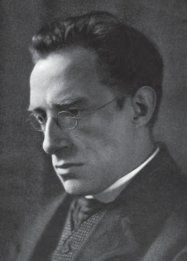Joseph Holbrooke
Joseph Holbrooke was born on 5 July 1878 in Croydon (England) as Joseph Charles Holbrook. His father was a music teacher and his mother a singer. Joseph Holbrooke learned to play the piano and violin from his father from an early age. In 1893 he began his studies at the Royal Academy of Music under Frederick Corder (composition) and Frederick Westlake (piano). During his student years Joseph Holbrooke also composed his first works with immediate success: He was awarded the Charles Lucas Prize for composition during his last student year in 1897.
After finishing his studies Joseph Holbrooke first worked as a piano accompanist and private music teacher. At that time he also changed his name to Holbrooke (adding an e to avoid confusion with his father Joseph Holbrook who still worked as a music teacher as well). In 1901 he won the Lesley Alexander Prize in composition for his Sextet and received an invitation from Granville Bantock to teach at the Birmingham and Midland Institute School of Music. He quit this job only a year later and focused on composing and started his career as a concert pianist. During this decade till the start of World War I Joseph Holbrooke composed several works which received notable performances under such renowned conductors like Henry Wood, Thomas Beecham, Artur Nikisch or Hans Richter. He also won another composition prize for his Fantasie Quartet in 1905.
After World War I the compositions of Joseph Holbrooke were performed less and less with a few important exceptions: his opera „The Children of Don“ was performed several times in Vienna (under Felix Weingartner) and Salzburg (under Ludwig Kaiser) in 1923 and his ballet „Aucassin and Nicolette“ was performed over 200 times by the Markova-Dolin Ballet Company in 1935/36. But in general Joseph Holbrooke and his music was mainly neglected in his later years and neither received many concert performances nor was broadcasted through the BBC. He nevertheless continued to compose music and spent much time in revising his older compositions.
Joseph Holbrooke died on 5 August 1958 in London (England).
In my archive are the manuscripts of the full score and the piano reduction of the composition "1914" resp. "Clive of India" by Joseph Holbrooke.
The composition "Clive of India, for brass band" has - like many of the works of Joseph Holbrooke - a manifold history. The work was most likely composed in the early 1920s and titled Dramatic Overture '1914' (or sometimes also called '1914-18'). Later (most likely around 1940) Joseph Holbrooke made a revision of the piece and also retitled it to 'Clive of India'. This version was then published by R. Smith & Co. in London. This final version was the test piece of the British Open Brass Band Championship, at Belle Vue, Manchester, in September 1940. The Open continued throughout the war unlike the National Championships. The contest was won by the Bickershaw Colliery Band conducted by William ‘Billie’ Haydock.
But the composition received several performances before the Championship, first in its original version and title '1914'. The autograph manuscript shows a hand-written note of Joseph Holbrooke about the years when a broadcast performance took place. The list starts with 1926, which should be the year of the world premiere. According to that note further performances took place in 1928 and 1934.

A widely known performance - often described as the world premiere - was by the Callenders Brass Band conducted by Tom Morgan in 1935, which was broadcasted by the BBC.
My manuscripts show the original version '1914' which consisted of 6 short movements. After the revision not only the names of the movements were changed but also the last movement was split into 3 smaller parts. The photo on the right shows the title page of the piano reduction and one can clearly notice that the former title '1914' at the top was scratched out and the new title 'Clive of India' was written in pencil below the words 'Dramatic Overture'. Also the movement titles changed from the original "I. The Summons" to "I. The call to Arm" (written in pencil above the first measure). The original and revised movement titles are:
| original version | revised version |
|---|---|
| '1914' | 'Clive of India' |
| I. The Summons | I. The Call to Arm |
| II. The Romance | II. The Love Romance |
| III. The Fight | III. The March to Battle + Victory |
| IV. The Song | IV. The Song of Peace |
| V. The Sadness | V. Reflection |
| VI. The Victory | VI. Preparing for the Return |
| VII. The Love Romance | |
| VIII. The Victor's Return |
I typeset the full score of the original version titled "1914", so it exists in digital format. But I was told by the Holbrooke family that they split all compositions of Joseph Holbrooke into the sections "worthy of performance" and "not worthy of performance". Unfortunately "Clive of India" (resp. "1914") falls into the latter section. Therefore I am not allowed to publish my typeset score here.

